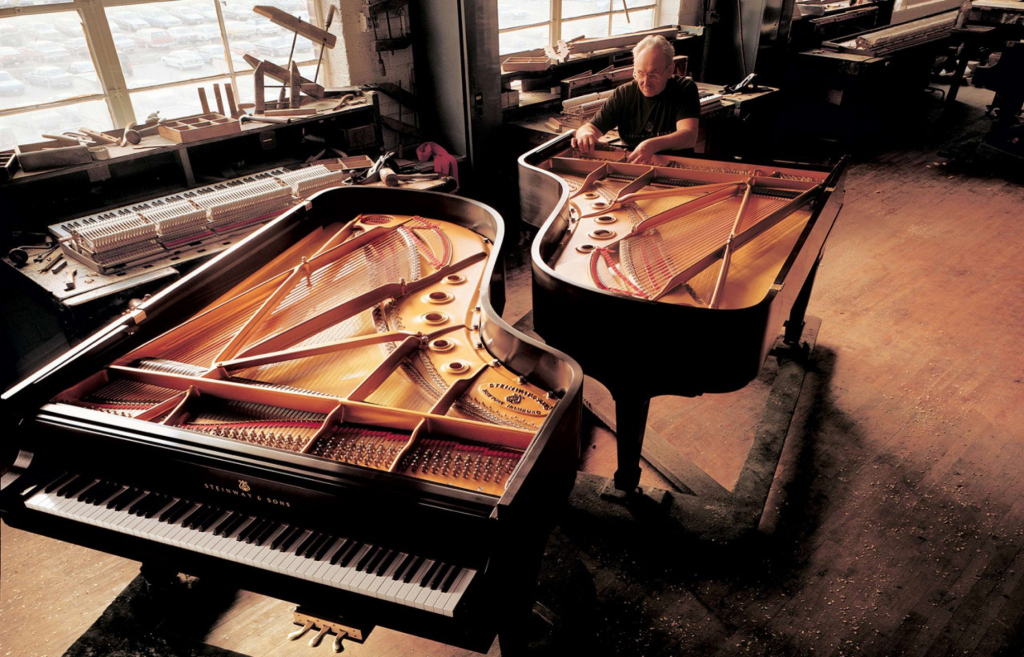Why Quality Control Is Critical in Piano Manufacturing
Creating a piano is a marvel of precision, craftsmanship, and engineering.
Given the piano’s sensitivity to environmental changes and the intricate interplay of thousands of components, strict quality control is essential at every stage of production.

Without rigorous testing and careful material selection, the performance, durability, and tonal beauty of a piano would be compromised. This level of craftsmanship also underscores why professional handling is vital when moving and storing pianos—a specialty of Keyboard Carriers in Denver, CO.
Quality Control in Design and Material Selection
The Role of the Scale Engineer
Quality assurance begins long before physical construction starts.
Scale engineers are responsible for:
- Designing the piano’s architecture
- Specifying material grades and properties
- Ensuring that all components interact harmoniously
Their careful planning forms the foundation for every successful piano.
Metallurgical Testing of the Iron Plate
The cast iron plate, a critical structural component, undergoes thorough inspection:
- Metal Content Verification:
Metallurgists test the composition of the iron to ensure ideal strength and resilience.
Key elements analyzed include:- Carbon
- Sulfur
- Phosphorus
- Manganese
- Temperature Monitoring:
Molten iron must reach 2,750°F (1,510°C) before casting.
Both the pouring and cooling (founding) processes are carefully monitored to prevent defects such as brittleness or uneven hardness.
String Quality Assurance
Piano strings are vital to sound production and must be extremely strong yet flexible.
During manufacturing, strings are extensively tested for:
- Elasticity:
To allow proper vibration without breaking. - Resiliency:
To withstand repeated striking from the hammers. - Tensile Strength:
To support the incredible tension each string must endure, it must maintain pitch and tone over time.
The Future of Piano Manufacturing
While the fundamental process of building a piano has remained consistent for more than a century, manufacturers are always looking for ways to improve efficiency, strength, and tonal quality.
Recent Innovations: Vacuum Casting
One exciting advancement is the introduction of vacuum casting techniques for the cast iron plate:
- Smoother Finish:
Vacuum casting produces plates with ultra-smooth surfaces, reducing the need for labor-intensive grinding and polishing. - Improved Consistency:
This method allows for a more uniform distribution of the molten metal, leading to stronger, more reliable plates. - Enhanced Sound Quality:
A better-formed plate supports cleaner vibrations and richer tonal resonance.
As these innovations take hold, future pianos may become even more durable, resonant, and visually stunning, while still honoring the traditional craftsmanship that has made the piano a beloved instrument for centuries.
Why Professional Care Matters for Every Piano
The tremendous precision and sensitivity involved in piano construction mean that even minor mishandling can cause lasting damage.
Whether moving an upright, a grand, or a concert piano, professional movers like Keyboard Carriers ensure that every part of your instrument—from the tension of its strings to the delicate balance of its frame—is protected.
We understand the fine craftsmanship that goes into every piano, and we move each one with the respect and expertise it deserves.
Contact Keyboard Carriers for Trusted Piano Moving Services
Protect your piano’s craftsmanship, sound, and structural integrity by choosing experienced professional movers.
Serving Denver, CO, and the surrounding areas, Keyboard Carriers offers careful, specialized piano moving and storage services.
👉 Contact Us Today to schedule your move or request a free consultation!
